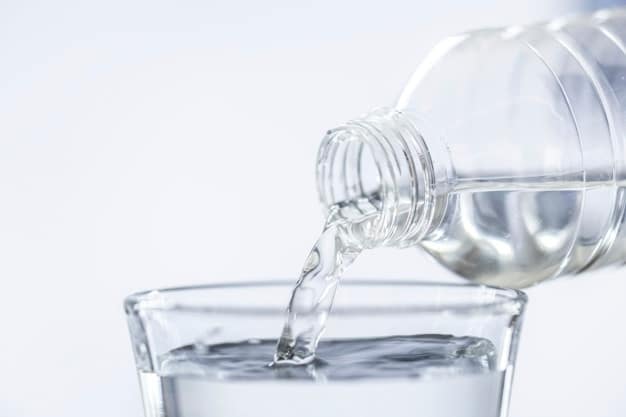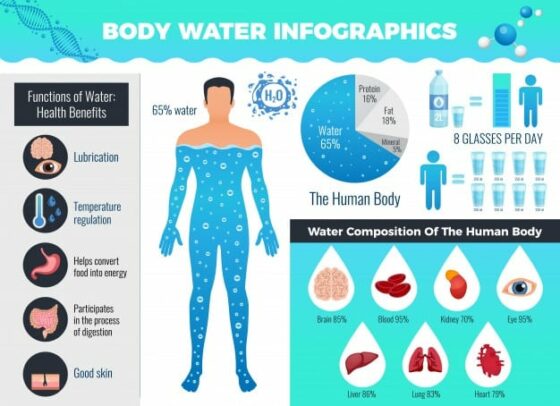Distilled water is celebrated for its purity, being commonly used in pharmacies and laboratories. In a distillation process, 99.9% of water’s bacteria, dissolved organics, and chemicals are eradicated. But, this purification process also removes essential minerals like magnesium, calcium, and sodium, raising a pertinent question: is distilled water safe to drink?
Table Of Contents
−The short answer is yes, distilled water is safe to drink. But let’s explore the details more in-depth and discuss the reasons why we need water, the role of minerals in our body, what distillation removes, the benefits and risks of drinking distilled water, and more.

Why is Water Essential to Our Health?
Understanding the role of water in our bodies helps us comprehend why the quality of the water we drink matters. Here are a few crucial functions of water:
- Lubricates the joints
- Protects cells and organs
- Aids in waste removal
- Dissolves nutrients
- Prevents body overheating
Water also helps maintain balance within our body by dissolving food for easier digestion, balancing the concentration of solutes, and maintaining homeostasis. As a result, every cell in our body contains water. The distribution of water in our body is as follows:
- Intracellular fluid (ICF): ⅔ of water inside the body
- Extracellular fluid (ECF): ⅓ of water inside the body

The Role of Minerals
Electrolytes are vital to our health. These are essential minerals that help transport fluids into your muscles and carry signals between cells. We primarily get these essential minerals from fruits and vegetables.
Interestingly, the U.S. doesn’t have a deficiency in mineral intake. Instead, it has an excess, especially in sodium. Many people consume up to 130-160 mmol/day of sodium when our bodies only need 1-2 mmol daily. This excess in sodium can lead to hypertension or high blood pressure. The role of water here is to help kidneys flush out these excess minerals.
Distilled Water: The Facts
Distilled water is the product of a water distiller. This device turns water into steam, leaving contaminants and minerals behind. Once the steam cools, it undergoes condensation to return to a liquid state. This process mirrors how nature recycles water through the hydrologic cycle.
No harmful chemicals or disinfectants are added to the water during distillation. Thus, distilled water is safe to drink. However, you’ll want to ensure you’re getting essential minerals from other sources since they are removed during distillation.
Uses of Distilled Water
Because of its minimal mineral content, distilled water is ideal for various household appliances and processes, including:
- Steam irons
- Watering plants
- Aquariums
- Car cooling systems
- Laboratory experiments
- Medical devices such as CPAP devices for sleep apnea
What Does a Water Distiller Remove?
The distillation process removes total dissolved solids (TDS) from the water, similar to reverse osmosis (RO) and deionization (DI). To remove volatile organic compounds (VOCs), a carbon postfilter is added to a water distiller. Here are a few contaminants that get eliminated in the process:
- Algae
- Arsenic
- Bacteria
- Viruses
- Chlorine
- Copper
- Cryptosporidium (crypto)
- Fluoride
- Lead
- Mercury
- Nitrates
- Pesticides
- Rust
- Salt
- Sulfates
- Foul tastes and odors
Additionally, electrolytes such as sodium, potassium, calcium, chloride, bicarbonate, and phosphate are also removed.
Benefits and Risks of Distilled Water
Benefits
- Removes 99.99% of dissolved solids and bacteria
- Contains no extra sodium
- Prevents the development of scales on appliances
- Reduces the risk of waterborne diseases
- Reduces the risk of consumption of harmful chemicals
Risks
- Lack of essential dissolved minerals like calcium and magnesium
- Flat taste leading to reduced consumption
- Decrease in the body’s metabolic function
- An increase in urine output can lead to electrolyte imbalance when over-consumed
- Cannot replace minerals lost through sweat
- Distilled water fasting can be dangerous as it may lead to acidosis
- Leaves behind highly salinated or hard water, which may disrupt our environment
Alternatives to Distilled Water
While distilled water is safe to drink, there are other options available, like carbon filter systems, reverse osmosis systems, and ultrafiltration systems. These systems offer different methods of water purification while maintaining the presence of dissolved minerals.
Frequently Asked Questions About Distilled Water
Can distilled water go bad?
If you plan on drinking distilled water, it’s best to discard a jug after five years. However, for other purposes, such as for appliances, an older jug should be okay.
Is it safe for babies to drink distilled water?
Absolutely! Distilled water is free of harmful chemicals, making it a safe option to mix with baby formula.
Can I distill water at home?
Yes, distillation kits are available, and you can also find numerous online tutorials to make your own distilled water at home!
Wrapping Up: Is Distilled Water Safe?
To reiterate, distilled water is indeed safe to drink. If you are getting enough minerals from your diet, then you won’t face any significant issues. In addition, distilled water provides you with pure, tasteless, and odorless water that is free from harmful substances. Moreover, it can even help maintain the efficiency of your home appliances. So go ahead, drink up, and enjoy the purity of distilled water.

Jay
Jay is a health and wellness enthusiast with expertise in water quality and nutrition. As a knowledgeable advocate for holistic well-being, Jay successfully manages Type 2 Diabetes through informed lifestyle choices. Committed to sharing reliable and authoritative insights, Jay combines firsthand experience with a passion for enhancing health."

